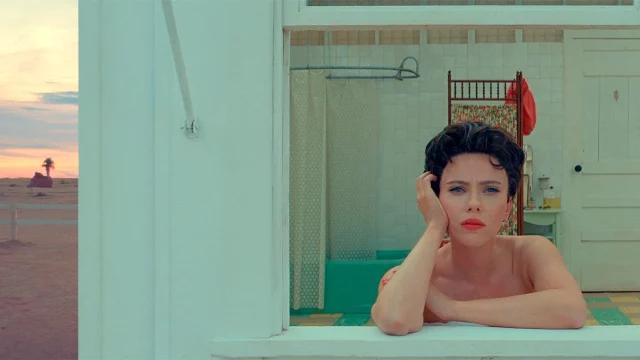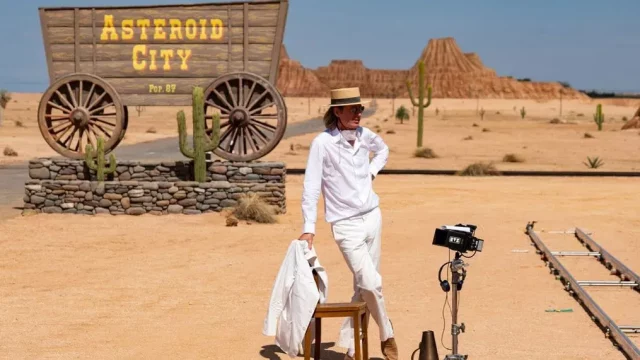Review: Wes Anderson’s ‘Asteroid City’

Wes Anderson is not everyone’s cup of tea, but for the devoted his flavor is irresistible. For the past 27 years years, his idiosyncratic way of making movies has enamored many. Look at most lists of best American films of the 21st Century and you’re bound to find The Royal Tenenbaums, The Fantastic Mr. Fox, or The Grand Budapest Hotel. Beneath the immersive set designs, bright colors, and painstakingly symmetrical shot compositions that hallmark his work, Anderson‘s best films can bring forth an aching humanity that touches down deep in the soul. An aspect I’ve found to be missing from some of his most recent work. So where does that leave his latest film Asteroid City, you may ask?
The twee overload of Isle of Dogs and the scattershot anthology nature of The French Dispatch left me cold. It felt as though form had overtaken function as the modus operandi for Wes Anderson. In my eyes, his directorial proclivities shifted more toward the aesthetic than the human. Anderson’s latest release, Asteroid City, certainly does not dial back on these qualities. Sometimes this can be a detriment to the film; however, it retains a palpable sense of introspection and wonder that leaves more than enough for the savvy audience member to ponder.
Even as it stumbles, it is a much more complete effort from one of American cinema’s most unique contemporary voices. Is that enough to make a visit to Asteroid City a worthwhile endeavor? Read on, to find out my thoughts.
[Warning: Light Spoilers and Impressions of Asteroid City are below!]
Wes Anderson spins another quirky yarn in Asteroid City
The year is 1955. Recently widowed Auggie Steenbeck (Jason Schwartzman) and his children arrive in Asteroid City, the town in which the film is named, a spot where an asteroid once made landfall that now serves as the grounds of an annual academic competition and a tourist spot for families.
As his son Woodrow (Jake Ryan) endears himself to the other kids with his own inventions, and his father-in-law (Tom Hanks) arrives to put the pressure on him, Auggie becomes smitten with famous actress Midge Campbell (Scarlett Johansson), who has taken up a temporary residence for the celebration.

Much of Asteroid City functions as a hang-out comedy of sorts. The story by Anderson and Roman Coppola as told through Anderson‘s script allows us to see the characters in a fishbowl of sorts. Various plot lines of contrasting tones, all captured through deadpan irreverence by a committed ensemble including such talent as Jeffrey Wright, Maya Hawke, and Tilda Swinton, gives the feel of a summer camp for all ages.
Even when the proceedings veer into science-fiction territory, the coming-of-age narrative stays at the forefront. It’s hard not to fall for the charm of it all, whether it be Hawke‘s teacher character falling for the simpleton singing cowboy (Rupert Friend) or a group of kid scientists perfecting their ingenious creations.
Where Asteroid City gets perhaps a bit too big for its britches is an (initially, at least) confounding meta-story. The main narrative is actually a play, written by the legendary Conrad Earp (Edward Norton), who works with director Schubert Green (Adrien Brody) and an aspiring actor (also Schwartzman) to put on his masterwork.
Entertaining in its own right, the extra layer of storytelling doesn’t fit seamlessly on top in the same way that The Grand Budapest Hotel‘s framing device did. The double-casting of the actors from the main story as actors in the “putting on the play” story confuses, and Bryan Cranston‘s narrator who traverses between stories doesn’t quite bridge the gap. It instead leaves the audience scratching their heads looking for the connections rather than enjoying the story independently for what they are.
A pastel paradise worth living in
There’s nothing confounding about the visual beauty of Asteroid City. Director of photography Robert Yeoman, along with production designer Adam Stockhausen bring to life a pastel paradise, at once uncanny and full of recognizable Americana. The small desert town full of sparse old buildings, small motels, and the expanse of the world surrounding it calls to mind the contradiction of isolation and warm community present in places like Marfa, Texas, or much of New Mexico. Wes Anderson maintains a remarkable amount of control over the visuals, nay, the feeling of Asteroid City.

In terms of the play storyline, pleasant black-and-white cinematography allows it to be more subdued and take on a matter-of-fact, though still plenty stylized, feel. There’s still plenty of immersion present in this layer of the story, yet across both stories there’s the constant of Anderson doing what he does best: creating a dream-like, but a familiar world that, for all its eccentricities or perhaps because of them, allows genuine humanity to come forth.
All we can do is keep moving forward
For all of the aesthetic magnificence and misgivings about the nature of its story mechanics, Asteroid City gets it right where it counts. All of the characters in this film are at standstills in their lives, lorded over by fears: small or big, internal or external. Although the film is only sporadically interested in probing the minutiae of these fears, it offers up a rather optimistic solution: keep moving forward. Keep telling the story.
You can’t control what life will throw at you, but you can find renewal by refusing to give up. By choosing to live. By engaging in community. Asteroid City‘s shagginess is offset by its willingness to wear its heart on its sleeve while providing something of real affirmation to those who, for one reason or another, feel lost or stuck. Beneath the warm nostalgia of the titular town lies a reflection of us, and a seeming want of Anderson to make a statement for people who have, through turbulent political times, a worldwide pandemic, what have you, feel increasingly isolated.
Where Asteroid City falls in the oeuvre of Anderson‘s work can’t possibly be judged right now. After all, he’s been making features for 27 years with no real signs of stopping. Nonetheless, his latest film is another inimitable work from an inimitable filmmaker who hasn’t fallen out of touch with his audience. One can practically see all the pieces of great writing in this film come down the pipeline. If an off-kilter retreat is what you seek, book a trip to Asteroid City.
My rating for the film:
★★★1/2/ ♥♥♥♥♥
Asteroid City is in theaters on June 16. Will you be checking it out? Let us know on Twitter or in the Cosmic Circus Discord!
Polite Society Review: An Action-Packed One-of-a-Kind Story



